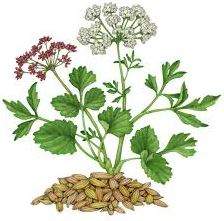Anise
The Herb Anise
Aniseed should not be confused with the tree star anise. Get inspiration for its use on this page and read more about its properties.
Properties Aniseed
- Family: Umbelliferae
- Species: Pimpinella anisum
- Biotope: Syria, Egypt; permeable soil, calcareous, sunny.
- Height: Up to 50 cm
- Originates from: Mediterranean countries (eastern)
Aniseed has branched, medium green stems. The stems are grooved and round. The leaves of aniseed are sweet-smelling, the lower ovoid and serrated.
The leaves become narrower at the top of the plant.

Aniseed flowers consist of clusters of small star-shaped white flowers.
Name in Different Languages
- English: Anise
- German: Anis
- French: Anis
- Italian: Anice
- Spanish: Anís
Use and Application of Aniseed
Various parts of the anise plant can be used in the kitchen. Especially the anise seeds are well known in many countries. The seeds (whole or bruised) are used to flavor desserts, cakes, sweet and sour preserves, curries, and bitters, such as arrack.
We mainly refer to the European (Greek), Arabic, and Indian kitchens. In Turkish cuisine, it is also used in fish dishes.
The taste of aniseed seeds is fresh, soft (slightly sweet), and of course, that typical aniseed taste.
Aniseed Leaves in the Kitchen
Aniseed leaves can also be used in the kitchen; they can garnish in salads, soups, and vegetables.
The flowers and leaves are also added to fruit salads.
The stems and roots also add flavor to sweet soups and stews.
Aniseed Tea and its Healing Effects
The seeds are used to make aniseed tea. Aniseed tea, drawn from the seeds or seeds in cooked food, improves digestion and suppresses nausea.
Aniseed is expectorant and soothes tickling coughs. It is therefore often used in cough medicines.
Aniseed promotes breastfeeding, as it has a weak oestrogenic effect.
Furthermore, anise stimulates the sex drive.
The etheric oil of anise (from the seeds) is in large quantities very poisonous. This aniseed oil is added to perfumes, toothpaste, and medicines to reduce the taste of the medicine.